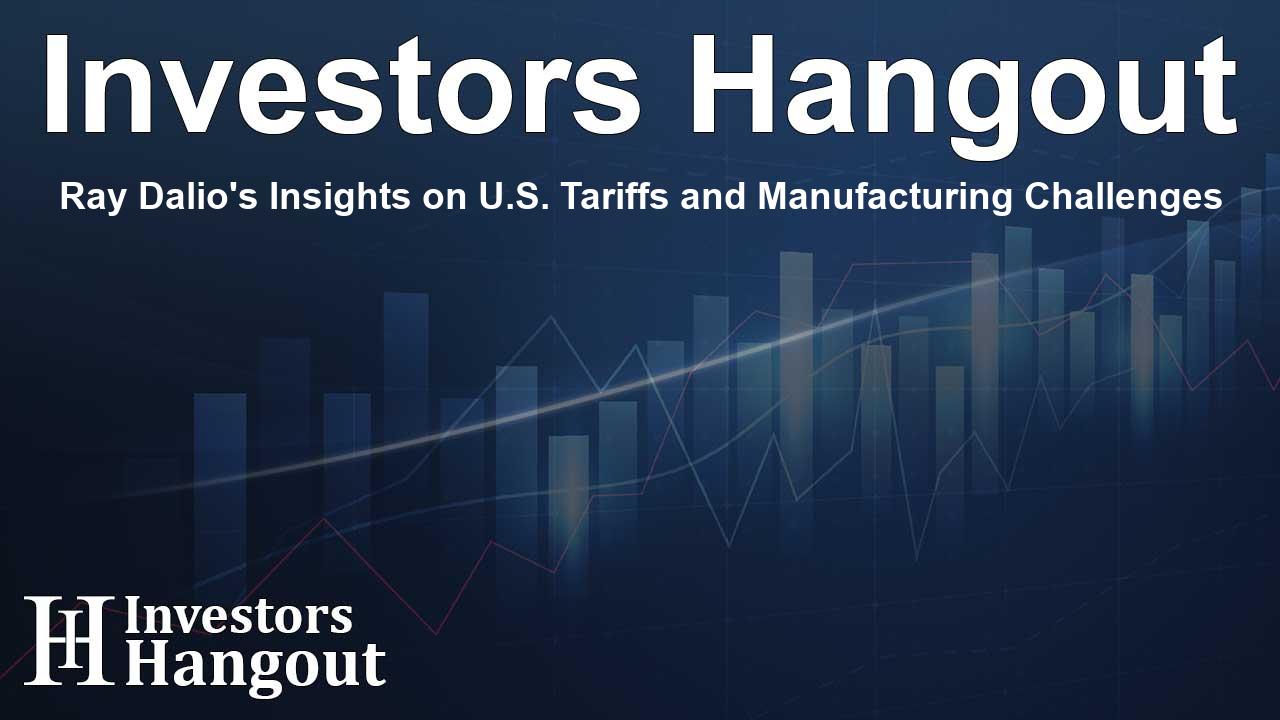Ray Dalio's Insights on U.S. Tariffs and Manufacturing Challenges

Understanding Ray Dalio's Perspective on Tariffs
Billionaire investor Ray Dalio recently expressed significant concerns about President Trump's ongoing tariff initiatives. He cautioned that these tariffs might exacerbate economic conditions such as stagflation, rather than effectively rejuvenating U.S. manufacturing.
What to Expect from Tariff Policies
Dalio noted, "The tariffs are being implemented as a symptom of changes that are forthcoming, irrespective of their imposition." He shared his thoughts through a video message, emphasizing that tariffs are a reaction rather than a solution.
The Goals of Tariffs and Their Effectiveness
The White House's intentions behind these tariffs include generating revenue and fostering a manufacturing landscape vital for employment and national security. However, Dalio remains skeptical about achieving these objectives. "I doubt whether tariffs will indeed bring manufacturing back to the U.S.," he asserted.
The Shift from Efficiency to Control
The renowned hedge-fund manager believes the global economy is transitioning from a paradigm of unconstrained trade to a more regulated environment where production efficiency could decline. He stated, "This shift results in less market efficiency, leading to higher inflation and slower economic growth."
This Situation's Wider Economic Implications
Dalio's perspective aligns with mounting concerns voiced by various economic experts regarding the potential ripple effects of tariff-induced supply disruptions. These could significantly impact global economic growth forecasts, according to recent analyses from top institutions.
The Concerns of Predictable Economic Fallout
Trump's proposed reciprocal tariffs, with potential rates surging to 70% on specific imports, have already contributed to market volatility. Analysts continue to cite fears reminiscent of the trade conflicts witnessed earlier, particularly during 2018.
Long-Term Economic Warnings from Dalio
Over the months, Dalio has made repeated warnings to his followers, emphasizing that these tariffs may be too late to counteract the trends of de-globalization. He believes the rising federal debt, combined with inflated import costs, poses major risks of substantial economic disruption.
Balancing Taxation with Tariffs
The argument surrounding tariff implementation hinges on the belief that such measures might fund domestic tax reductions while compelling international partners to negotiate better trade deals. Conversely, critics point out that increases in material costs could jeopardize U.S. exporters.
Conclusion: Are Tariffs a Tangible Solution?
Ultimately, Dalio characterizes the current tariff strategies as theoretical, leaving uncertainty about their actual impact on the U.S. manufacturing sector. He concludes that whether these tariffs will contribute to real progress in revitalizing American factories remains to be seen.
Frequently Asked Questions
What are Ray Dalio's main concerns regarding tariffs?
Dalio believes that tariffs might not effectively bring manufacturing back to the U.S. and could worsen economic conditions.
How might tariffs influence inflation rates?
Dalio suggests that tariffs could lead to higher inflation due to decreased market efficiency.
What does Dalio mean by a "controlled world"?
By a "controlled world," Dalio refers to an economic environment where production is not solely determined by efficiency, leading to various negative economic repercussions.
How do tariffs affect global economic growth?
Recent forecasts indicate that tariff-related supply shocks could reduce global growth rates significantly in the coming years.
What is the relationship between tariffs and U.S. exports?
Higher tariffs may increase input costs, potentially harming U.S. export competitiveness on the global stage.
About The Author
Contact Owen Jenkins privately here. Or send an email with ATTN: Owen Jenkins as the subject to contact@investorshangout.com.
About Investors Hangout
Investors Hangout is a leading online stock forum for financial discussion and learning, offering a wide range of free tools and resources. It draws in traders of all levels, who exchange market knowledge, investigate trading tactics, and keep an eye on industry developments in real time. Featuring financial articles, stock message boards, quotes, charts, company profiles, and live news updates. Through cooperative learning and a wealth of informational resources, it helps users from novices creating their first portfolios to experts honing their techniques. Join Investors Hangout today: https://investorshangout.com/
The content of this article is based on factual, publicly available information and does not represent legal, financial, or investment advice. Investors Hangout does not offer financial advice, and the author is not a licensed financial advisor. Consult a qualified advisor before making any financial or investment decisions based on this article. This article should not be considered advice to purchase, sell, or hold any securities or other investments. If any of the material provided here is inaccurate, please contact us for corrections.
